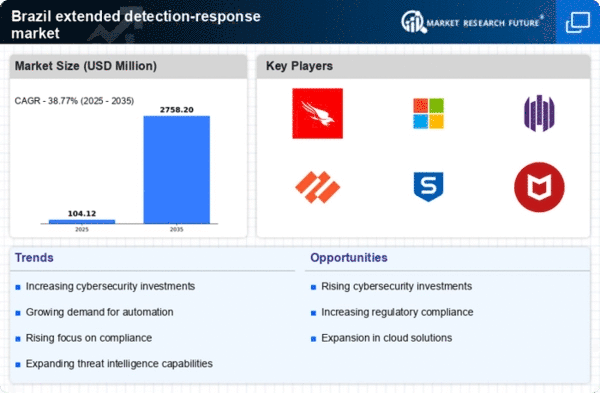Rising Cyber Threats
The increasing frequency and sophistication of cyber threats in Brazil is a primary driver for the extended detection-response market. Organizations are facing a surge in ransomware attacks, phishing schemes, and data breaches, which necessitate advanced security measures. According to recent data, cybercrime costs Brazil approximately $7.4 billion annually, highlighting the urgent need for effective detection and response solutions. As businesses recognize the potential financial and reputational damage from these threats, investment in the extended detection-response market is likely to grow. This trend indicates a shift towards comprehensive security frameworks that can address complex attack vectors, thereby enhancing overall resilience against cyber threats.
Increased Regulatory Scrutiny
The regulatory landscape in Brazil is becoming more stringent, particularly concerning data protection and cybersecurity. The implementation of laws such as the General Data Protection Law (LGPD) has heightened the focus on compliance, compelling organizations to invest in the extended detection-response market. Companies face substantial fines for non-compliance, which can reach up to 2% of their revenue. This regulatory pressure is driving businesses to adopt advanced security solutions that not only protect sensitive data but also ensure adherence to legal requirements. As organizations strive to mitigate risks associated with regulatory penalties, the extended detection-response market is likely to see increased investment.
Growing Digital Transformation
Brazil's ongoing digital transformation across various sectors is significantly impacting the extended detection-response market. As organizations increasingly adopt cloud services, IoT devices, and mobile technologies, the attack surface expands, creating new vulnerabilities. A report indicates that 70% of Brazilian companies are prioritizing digital innovation, which in turn drives the demand for robust security solutions. The extended detection-response market is positioned to provide the necessary tools to monitor, detect, and respond to threats in real-time, ensuring that businesses can operate securely in a rapidly evolving digital landscape. This trend suggests a strong correlation between digital adoption and the need for enhanced security measures.
Emergence of Cybersecurity Skills Gap
The cybersecurity skills gap in Brazil is a critical driver for the extended detection-response market. With a shortage of qualified professionals, organizations are struggling to effectively manage their security operations. This gap is prompting businesses to seek automated solutions that can supplement human expertise. The extended detection-response market offers tools that can automate threat detection and response processes, thereby alleviating some of the burdens on understaffed security teams. As companies aim to bolster their cybersecurity posture amidst a talent shortage, investment in automated detection-response solutions is likely to increase, further propelling market growth.
Demand for Integrated Security Solutions
There is a growing demand for integrated security solutions in Brazil, which is influencing the extended detection-response market. Organizations are increasingly seeking comprehensive platforms that combine various security functions, such as threat detection, incident response, and vulnerability management. This trend is driven by the need for streamlined operations and improved efficiency in managing security incidents. As businesses recognize the limitations of siloed security tools, they are more inclined to invest in solutions that offer holistic protection. The extended detection-response market is well-positioned to meet this demand, providing integrated solutions that enhance visibility and control over security environments.
















